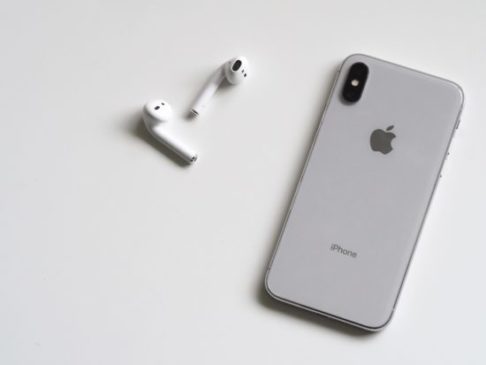
When Steve Jobs introduced the iPhone in 2007, we knew we were looking at an amazing technology that would revolutionize how we used the Internet. What we did not know is how much these devices were going to change us. From the moment Apple declared that “there’s an app for that,” the percentage of our day spent staring at screens increased.
For Christians, we could possibly say that our phones improve our spiritual lives. We have access to a world of information through Bible apps, podcasts, and other resources. No generation of Christians has had the easy access to God’s word and solid teaching that we have. Yet, we could also argue that we know much less of the Scriptures than many previous generations of Christians.
Our phones have not made us more faithful followers of Jesus. We spend time scrolling through social media that we should spend in our Bible. We tend to look down at our phones instead of interacting with the people around us. We are less empathetic, know less about our communities, and are more narcissistic because of the time we spend with our smartphones and related technologies.
Throwing out all technology and going back to the way things were before is not an option. Many of these technologies have legitimate uses that can help us in our careers, our friendships, and our Christian lives. What we need is a healthier relationship with our technology and deeper thought into how we use these devices on a day to day basis.
What follows is not everything that could be said about Christians and our phones. (Andy Crouch’s excellent book The Tech-Wise Family says many, many things I do not have the space to say here.) As Jonathan Edwards famously came up with resolutions to govern every aspect of his life, we desperately need to come up with resolutions to specify how we will and won’t use technology in our lives and homes.
As a starting point, I would like to suggest four resolutions about phone use that every Christian should make.
I will read my Bible before I start scrolling on my phone.
Jen Wilkin often says, and I thoroughly agree, that we find ourselves in a biblical literacy crisis. Read books and letters from two hundred years ago and you will run across countless allusions to biblical people, places, and events. These references weren’t limited to Christian authors either, for many who did not profess faith in Christ still lived in a world in which comprehensive biblical knowledge was commonplace. They had no apps. They had no podcasts. They had no websites. They had the King James Bible, Sunday School, weekly sermons, and Bible reading in the home, yet they possessed a knowledge of the Scriptures that we cannot claim.
While we could devote many posts to the role pastors have played in fostering biblical illiteracy through anemic preaching, my goal here is to focus on us as individual believers. We have neglected the Bible. We don’t read it by ourselves or with our families and it rarely becomes the subject of our discussions.
If we devoted half of the time that we spent on social media apps to the reading and study of Scripture, the biblical literacy crisis would be over in a few years. Resolve this right now: “I will not spend time on social media, texting, or playing games until I have read my Bible.” We spend too much time in a fantasy land where we think we will magically “find” the time to read and study the Scriptures when instead we must make the time for them. Read it every day. Don’t open an app until you have.
I will not allow my work to suffer because of my phone use.
Something in our brains causes us to push back against tasks that are hard or uncomfortable. When we hit a rough spot in our work, we are tempted to pull out our phone just to “check” social media or our email because the dopamine hit from a notification is better than the pain of working. However, every time we do this, we break the concentration that we need to do our work well. We create a loop where we reward ourselves with a dopamine hit for shying away from hard work and our work suffers for it.
As followers of Jesus, we work for God and not for men. (Colossians 3:23) At the same time, though, hard work is a way to love our neighbors. If you have a boss, the success of his job depends on the work you do. By losing concentration and slacking in your work, you make his job harder. You let down co-workers who depend on you. If you are a freelancer, you are not earning the money you need for your family’s sake. Your good work is a blessing to other people and slacking is a curse to them. Don’t let triviality cause your work to suffer.
I will value real-life connections over connections made through my phone.
We all can tell the story of sitting in a restaurant next to a family who are all on their phones. They each sit there quietly ignoring each other and absorbed in their own little world. After telling the story, we all would have to admit we have done the same. Our phones become a comfort to us in awkward moments. It is almost as if every twinge of boredom and every lag in a conversation becomes an excuse to pull out our phones and scroll.
Our phones connect us to people all over the world, but they can cause us to neglect the people in front of us. The result is that our relationships–marriages, children, and friendships–all suffer. Studies show that the presence of a phone on a table lessens the quality of a conversation, so when you get together with other people, keep the phone in your pocket or purse. When you walk into the house, put the phone down in a room other than the one where your family congregates. Wherever you are, be fully there.
I will track the amount of time I spend on my phone.
Paul tells us in Ephesians 5:16 to make the best use of our time because we live in evil days. While we don’t want to become obsessive to the point of paranoia about how we spend our time, we do want to think about how we use the time God has given us. We can, without knowing we have done it, spend half an hour on our phones and not even remember what we have seen.
Your time is valuable. It is a gift from God and it is limited. He created you for more than giving all of your attention to social media companies. Track how much time you spend on your phone. Use an app like Moment, set a limit for how much time you will spend on your phone, and don’t go over. Take the time you saved and read your Bible, spend time in prayer, talk to a friend, get to know a neighbor, learn a new skill, or go for a walk. You will find that this will be infinitely more rewarding and fruitful than staring at a screen.
We can show some benefit smartphones have brought us, but the negatives far outweigh the positives. We are becoming more calloused, less empathetic, less productive, more distracted, less engaged, less informed, and more biblically illiterate. Let us, by God’s grace, resolve to use technology with more wisdom so we live lives that bring us more joy and God more glory.
Related Posts:
“Watching Our Words in an Age of Outrage“
“How to Sharpen Your Concentration for Bible Reading“
For Further Reading:
The Tech-Wise Family by Andy Crouch
12 Ways Your Phone is Changing You by Tony Reinke












